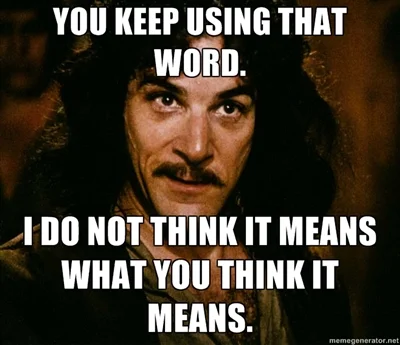Do You Know What "Postpartum" Means? Read This.
I have a suspicion that not everyone knows what the word “postpartum” means. Is it just me or is “postpartum” often used synonymously with “postpartum depression”?
I suffered with postpartum after my first baby.
How do you know if you have postpartum? Does postpartum happen to all new parents?
Take care of yourself and make sure you get enough sleep and good nutrition, or you’re headed for postpartum.
These are all examples of the INCORRECT ways that I’ve seen “postpartum” used - on the internet and in real life. It’s time we all started using correct terminology.
Postpartum simply means “following childbirth or the birth of young”.
Note that it’s most often used as an adjective - a descriptor - and therefore it must describe a noun. It is not a thing (noun) on its own! When used correctly as an adjective, “postpartum” MUST be used to describe another word. Examples: postpartum person, postpartum hospital room, postpartum nutrition, postpartum doula, postpartum bleeding, postpartum bliss.
This is straightforward, right? So now let’s look at two specific terms.
1. Postpartum Period: a period of time following the birth of a child. There’s no “official” definition for how long this period of time is. Once you’ve had a baby you’re always postpartum (giving birth is irreversible!) so sometimes professionals will clarify by saying “the immediate postpartum period” or “early postpartum days” which generally refers to the weeks or maybe months following a birth, not several years down the road.
2. Postpartum Depression: depression that occurs following the birth of a child. It shouldn’t be confused with the baby blues, nor should it be used as a catch-all term for postpartum mood disorders - of which there are several that are distinct from one another - but that’s another topic for another post.
What I’ve found is that people often just say “postpartum” when they’re actually referring to postpartum depression (or the baby blues, or a different postpartum mood disorder)...see my examples at the beginning of this post! If this is you, please stop.
Besides the fact that it’s grammatically incorrect, this habit reinforces the negative connotations surrounding this word. When asked for the first thing they think of when they hear the word "postpartum", most people will answer “depression”.
Let’s get the record straight: the postpartum period is just a period of time following the birth of a child...that’s it!
Everyone who’s had a baby experiences the postpartum period, but not everyone experiencing the postpartum period will also experience depression. Make sense?
Let’s start using our words more carefully. If you’re talking about postpartum depression, say “postpartum depression” - don’t just say “postpartum”. It doesn’t make sense, and it’s damaging.
Other correct uses of “postpartum” are:
I am 3 days postpartum.
If you’re pregnant or postpartum, you may not want to take this herb.
These examples are a little different than using it before a noun in a sentence, but it works...and of course, context is everything. If someone is using “postpartum” when they’re actually talking about the baby blues or a postpartum mood disorder, it’ll probably be obvious. I encourage you to clarify their meaning and offer some gentle correction. This is part of the work of changing our cultural conversation about the postpartum period - and it’s important work, if you ask me. Of course, be kind! They may not realize they’ve said anything incorrect...because as I said, “postpartum” is so frequently used synonymously with “postpartum depression” that this mistake has become acceptable.
I’d love for all the weight to be taken out of the word “postpartum”. It’s only an adjective meaning “following childbirth”, yet it’s so damn heavy! I think one of the reasons it’s so heavy is because we don’t speak openly and frankly about postpartum experiences - the good, the bad, and everything in between. If we started engaging in these types of conversations, unabashedly, well...who knows what could be possible for postpartum families! Less fear, less shame, more love and compassion and support, perhaps?! These are the kinds of values I stand for, in my work and in life.
Changing the way we speak about the postpartum period starts with using correct terminology. Words are powerful. So let’s all be mindful and support each other with this. Thank you for reading!
Have you also noticed folks using “postpartum” incorrectly? Comment below, and please share this post!

